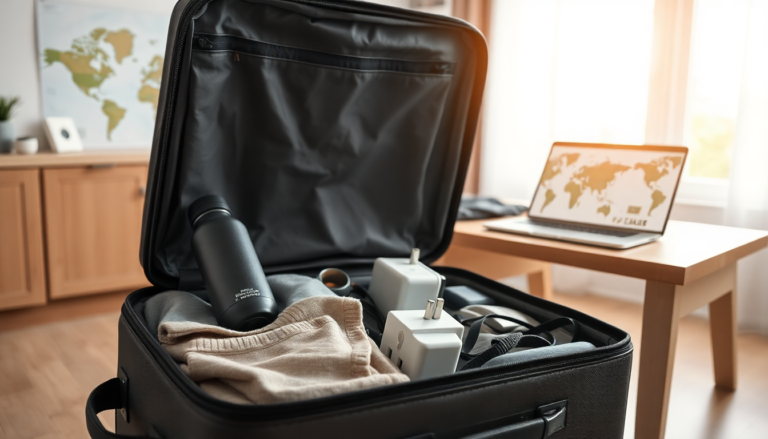Argomenti trattati
- Southwest Airlines introduces checked baggage fees
- Important updates on travel reimbursements for university employees
- Understanding the daily meal and incidental expense allowances
- The Fly America Act and Open Skies Agreement
- Booking tips for a seamless travel experience
- Considerations for student and non-employee travel
- Your travel resources
Imagine you’re all packed and ready to jet off for a much-awaited getaway when suddenly, you hear news about new baggage fees or travel policies. It can throw a wrench in your meticulously planned itinerary! As we roll into 2025, there have been significant updates in travel regulations and airline policies that every traveler should be aware of. From Southwest Airlines’ new baggage fees to updated reimbursement policies for university employees, staying informed is crucial for a smooth journey. Let’s dive into these updates and what they mean for you.
Southwest Airlines introduces checked baggage fees
Starting May 28, 2025, the skies will look a bit different for travelers using Southwest Airlines. Known for their previously unrestricted checked baggage policy, they are now implementing fees for checked bags. This change is a first for the airline, and it’s important for travelers to factor this into their budgets—especially if you’re someone who likes to pack that extra pair of shoes or your favorite jacket. A-List Preferred members will still enjoy some perks, but for the average traveler, this could mean adjusting how you pack or planning ahead to avoid those extra costs. I remember when I took a trip last summer and was able to breeze through check-in with just a carry-on. It felt liberating, and now it seems even more appealing!
Important updates on travel reimbursements for university employees
For those associated with the University of Wisconsin, there are new guidelines regarding travel reimbursements that you need to be aware of. Employees are expected to exercise good judgment when incurring travel costs. If you’re traveling for business, remember that you can only claim reasonable and necessary expenses. This means no double-dipping or seeking reimbursement for things that were provided for free. How annoying is that? But it’s all about keeping things transparent and fair. Also, meals provided by international hosts can’t be claimed, so keep that in mind when dining out during your travels. It’s a bit of a minefield, but staying informed can help you navigate these waters more effectively.
Understanding the daily meal and incidental expense allowances
When it comes to travel, knowing what you can claim for meal expenses is essential. For university employees traveling overnight, the Meal & Incidental Expense (M&IE) per diem is your go-to. This allowance covers your meals and incidental expenses without the need for receipts, which is a huge relief! But there’s a catch—day trip travelers without an overnight stay might only be eligible for a $15 meal allowance, so be sure to check if your journey qualifies. Imagine being on a day trip and having to stretch that $15—it’s definitely a challenge! But hey, sometimes it’s all about the adventure, right?
The Fly America Act and Open Skies Agreement
If you’re planning on flying internationally using federal funds, you need to be aware of the Fly America Act and the Open Skies Agreement. These regulations require travelers to use a U.S. flag carrier unless certain exceptions apply. It might sound like a hassle, but it’s designed to support U.S. airlines. Just make sure to plan ahead because navigating international travel can be tricky. I’ve been caught in a situation where I had to switch airlines last minute because of these rules, and it was quite the adventure!
Booking tips for a seamless travel experience
With all these changes, how can you ensure your travel experience is as smooth as possible? Utilizing the Concur booking tool is highly recommended for university employees; it simplifies the process of making reservations and helps you stay within policy. Remember, booking through the university’s contracted travel agency not only saves you money but also helps avoid potential headaches down the line. And speaking of headaches, have you ever tried booking through a third-party site only to find out your reservation didn’t go through? A real nightmare! Stick to trusted channels for peace of mind.
Considerations for student and non-employee travel
When it comes to coordinating travel for students or non-employees, the same university travel policies apply, which can sometimes be a bit overwhelming. Students must be authorized drivers if they’re using personal vehicles for university-sponsored travel. This ensures safety and compliance with university policies. Plus, reimbursement for business mileage is based on the IRS-authorized mileage rate, so keep your receipts handy! I’ve often found myself riding shotgun on such trips, and let me tell you, the conversations and experiences shared during those drives are often as memorable as the destination.
Your travel resources
Don’t forget to utilize available resources for your travel needs. Whether it’s the UWL Travel Authorization Guide or the Lodging and Per Diem Calculator, these tools are designed to streamline your planning process. Plus, having a direct line of contact with your university’s travel manager can save you from potential pitfalls. As many know, navigating the ins and outs of travel policies can be daunting, but with the right support, it can also be an exciting adventure!

